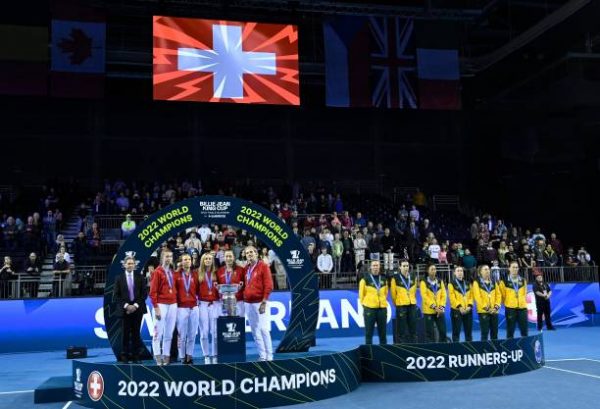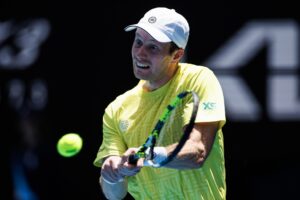Shakespeare may have thought that “a rose by any other name would smell as sweet”, but a World Cup by any other name simply doesn’t generate as much interest. Consequently, on a sporting weekend in Britain in which there were at least three other World Cups taking place (in rugby union, rugby league and cricket), many people in the UK, including many tennis fans, may not have realised that Britain was not only hosting the World Cup of Women’s Tennis (aka the Billie Jean King Cup, formerly the Fed Cup) but doing very well in it, before Switzerland made history by winning it for the first time.
Every World Cup Needs A Successful Host
It is a long-established sporting truth that every World Cup needs a successful host to generate interest in the host country. The Women’s World Cup of Tennis/Billie Jean King Cup certainly had that in Glasgow, where the tournament was held, as Great Britain’s team staged a near-miraculous comeback after losing their first tie to Kazakhstan 2-1 by beating Spain 3-0, without even losing a set, to win the group and thus reach the semifinals. The great Glaswegian post-rock band Mogwai once wrote about seeing “Spaceships Over Glasgow”. Well, after Great Britain had completely overturned both the odds and the world rankings, it may have been possible to see “Tennis Players Over Glasgow”, or at least over the moon.
A Classic GB v Oz Semi-Final
Great Britain’s reward for beating Spain was a classic “GB v Oz” (Great Britain v Australia) semifinal. After Heather Watson had succumbed in straight sets to Storm Sanders, it was up to Harriet Dart to try to save the tie and take it into a decisive doubles rubber. She faced Ajla Tomljanovic, but having beaten Spain’s Paula Badosa (who is nearly a hundred places above her in the world rankings), Australia’s #1 held little fear for her. And in Glasgow, “BraveDart” – as she will surely come to be known after her heroic exploits on Scottish soil – showed once again that she is one of the great team tennis players in the women’s game by winning in straight sets.
The scene was set for GB’s doubles team, Alicia Barnett and Olivia Nicholls, to try and repeat their own heroics from the Spain match, when they had swept aside the Spanish pairing of Bolsova and Masarova in straight sets, 7-6 6-2. Once again, they played superbly, showing more than enough to suggest that they can be GB’s regular doubles pairing in the BJK Cup for years to come, before finally going down in a match tie-break, 6-7 7-6 10-6, to the Australian pairing of Sam Stosur and Storm Sanders.
Barnett and Nicholls did brilliantly to win the second set tie-break, but the ensuing match tie-break proved a tie-break too far for them, as the Australians finally edged them out. In a week in which the unique potency of team tennis – Davis Cup or BJK Cup – doubles had been seen at its absolute finest, with numerous volley rallies thrilling the crowd, it was a genuine shame that the match could not go to a deciding third set and, if necessary, a deciding third set tie-break. To curtail such an epic after just two sets and a match tie-break felt like scant reward for Barnett and Nicholls, who for a while had looked like they could be joining Morecambe and Wise and fish and chips as a classic British double act.
And So To The Final – Australia v Switzerland
Australia’s opponents in the final were Switzerland, which meant a match with none of the historic rivalry that an England or Great Britain clash with Australia in any sport generates. Instead of all the angst of an Ashes clash on the tennis court, this was a case of Aussie “mongrel” (the Australians’ own word for the fight required in any sporting contest) versus Swiss precision, and ultimately Swiss precision prevailed.
The Swiss team had won probably the toughest first round group in the tournament, as it also featured Canada and Italy, to reach the semifinals. However, having won “The Group of Death” that is another traditional feature of any World Cup, Switzerland rode all the momentum they had generated, and used all the disappointment of last year’s Billie Jean King Cup Final defeat to Russia in Prague, to sweep all before them in the last four.
It helped Switzerland enormously that they had a #1 player in outstanding form and then two other fine singles players who could be “rotated” between ties to keep them from getting too worn out in such an intense, week-long tournament. The two #2s for Switzerland in the singles were Viktorija Golubic and Jil Teichmann, and they each won both of the singles matches they played during the week, with Golubic’s three-set win against Canada’s Bianca Andreescu in the group stage and her straight-sets dismissal of Karolína Muchová of the Czech Republic in the semifinal particular highlights.
However, for the final itself it was Jil Teichmann who was selected for the singles ahead of Golubic, presumably because she was the more rested of the two. She certainly needed all the freshness she could muster to defeat Storm Sanders in the first singles tie, which proved to be another epic that Teichmann eventually won 6-3 4-6 6-3. Given that Sanders had played both singles and doubles all week, and is due to be getting married in Australia this week, it will be no surprise if she ends up limping down the aisle.
Sanders was at least saved from having to play another doubles match as Switzerland’s #1, Belinda Bencic, settled the tie and the tournament in the second singles match, defeating Ajla Tomljanovic in straight sets 6-2 6-1, although that score-line does not tell the whole story of a match in which Tomljanovic, in true Aussie style, fiercely contested every single point. Ultimately, however, it wasn’t enough as Bencic’s superior class (at #12 in the world, she is ranked nearly twenty places ahead of Tomljanovic, the world #33) finally told to secure Switzerland the title.
Is Belinda Bencic The Ultimate Team Tennis Player?
Perhaps it should have been no surprise that Bencic proved the player of the tournament, given that she is arguably the ultimate team tennis player, at least in the women’s game. Her greatest achievements as a tennis player, both in singles and doubles, have been achieved while representing Switzerland rather than just playing as and for herself. She can now add the Billie Jean King Cup to the Hopman Cup she won in 2019 and the two Olympic medals she secured last year in Tokyo (gold in singles and silver in doubles, alongside Golubic).
Quite why a tennis player should play so much better for her country than she does for herself is something of a mystery, but one that also points to the enduring interest in team tennis. Tennis is undeniably an individual sport, but most people play as part of a team (i.e. a doubles pairing) and there is absolutely no doubt that some players, like Bencic, respond best to being in a team environment. Perhaps it’s as simple as the old adage that it’s easier to let yourself down than it is someone else.
Whatever the reason, though, Bencic led Switzerland to their first ever World Cup of Women’s Tennis (Billie Jean King Cup), ensuring that 2022 will not simply be remembered in Swiss tennis circles for the retirement of Roger Federer. That they are only the 12th nation ever to win the trophy, and that such historic tennis nations as Great Britain and Serbia have never won it, only adds to the scale of their achievement. And finally, it can only be hoped that whenever and wherever they defend it next year, it will actually be called, with all due respect to the great Billie Jean King, the World Cup of Women’s Tennis. Then everyone will know how magnificent it is to win it.
Main photo:
Embed from Getty Images






